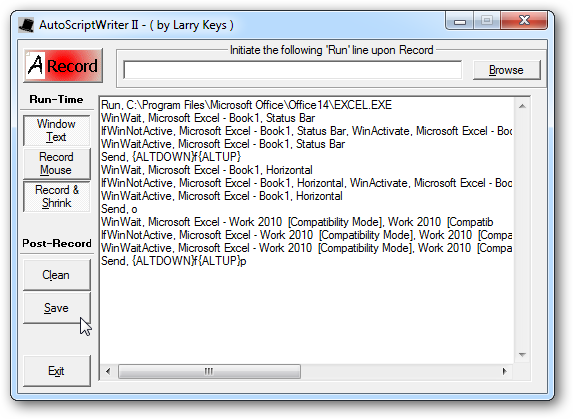Auto Script Writer 2 Larry Keys

5.29.7 / January 20, 2019; 49 days ago ( 2019-01-20) Dynamic Implementation language 1.0 or.pl,.pm,.xs,.t,.pod Website Influenced by,,,,,,, Influenced, [ ],, [ ],,,,,,, • at Wikibooks Perl is a family of two,,,, Perl 5. Obrazec zayavleniya o zaprose pensionnogo dela grande. Though Perl is not officially an acronym, there are various in use, including 'Practical and Reporting Language'. Perl was originally developed by in 1987 as a general-purpose to make report processing easier. Since then, it has undergone many changes and revisions., which began as a redesign of Perl 5 in 2000, eventually evolved into a separate language.
Both languages continue to be developed independently by different development teams and liberally borrow ideas from one another. The Perl languages borrow features from other programming languages including, (),, and; Wall also alludes to and in the introduction to (Schwartz & Christiansen) and so on.
They provide text processing facilities without the arbitrary data-length limits of many contemporary, facilitating manipulation of. Perl 5 gained widespread popularity in the late 1990s as a language, in part due to its then unsurpassed and abilities. In addition to CGI, Perl 5 is used for,, finance,, and other applications, such as for. It has been nicknamed 'the Swiss Army chainsaw of scripting languages' because of its flexibility and power, and also its ugliness.
The recorder is a good starting point but to get reliable scripts you need to write your script from scratch. Au3Recorder uses Mouse* and Send statements. Chiti na drift sports vkontakte player. So it depends on the screen size and position. And the user must leave mouse and keyboard alone while the script is running. Have a look at the Control* functions to enhance your script.
In 1998, it was also referred to as the ' that holds the Internet together,' in reference to both its ubiquitous use as a and its perceived inelegance. Contents • • • • • • • • • • • • • • • • • • • • • • • • • • • • • • • • History [ ] Early versions [ ] began work on Perl in 1987, while working as a programmer at, and released version 1.0 to the comp.sources.misc on December 18, 1987. The language expanded rapidly over the next few years. Perl 2, released in 1988, featured a better regular expression engine. Perl 3, released in 1989, added support for streams.
Originally, the only documentation for Perl was a single lengthy. In 1991,, known to many Perl programmers as the 'Camel Book' because of its cover, was published and became the de facto reference for the language.
At the same time, the Perl version number was bumped to 4, not to mark a major change in the language but to identify the version that was well documented by the book. Early Perl 5 [ ]. Main article: Perl 4 went through a series of, culminating in Perl 4.036 in 1993. At that point, Wall abandoned Perl 4 to begin work on Perl 5. Initial design of Perl 5 continued into 1994. The perl5-porters was established in May 1994 to coordinate work on porting Perl 5 to different platforms. It remains the primary forum for development, maintenance, and porting of Perl 5.
Perl 5.000 was released on October 17, 1994. It was a nearly complete rewrite of the, and it added many new features to the language, including,,,. Importantly, modules provided a mechanism for extending the language without modifying the interpreter. This allowed the core interpreter to stabilize, even as it enabled ordinary Perl programmers to add new language features. Perl 5 has been in active development since then. Perl 5.001 was released on March 13, 1995.
Perl 5.002 was released on February 29, 1996 with the new prototypes feature. This allowed module authors to make that behaved like Perl. Perl 5.003 was released June 25, 1996, as a security release. One of the most important events in Perl 5 history took place outside of the language proper and was a consequence of its module support.
On October 26, 1995, the (CPAN) was established as a for and Perl itself; as of May 2017, it carries over 185,178 modules in 35,190 distributions, written by more than 13,071 authors, and is mirrored worldwide at more than 245 locations. Perl 5.004 was released on May 15, 1997, and included among other things the UNIVERSAL package, giving Perl a base object to which all were automatically derived and the ability to require versions of modules. Another significant development was the inclusion of the module, which contributed to Perl's popularity as a. Perl is also now supported running under and several other operating systems.